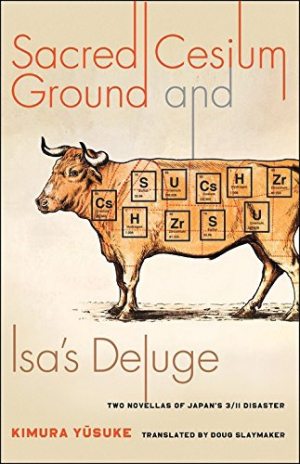Sacred Cesium Ground and Isa's Deluge
Two Novellas of Japan's 3/11 Disaster
The destructive earthquake, tsunami, and nuclear disaster that struck Japan in March of 2011 may be growing more distant in the public consciousness, but in Kimura Yūsuke’s Sacred Cesium Ground and Isa’s Deluge, forceful twin novellas recall the immediate aftermath of the tragedy.
In “Sacred Cesium Ground,” Tokyo housewife Hiromi decides to volunteer at a cattle farm known as the Fortress of Hope in a radiation danger zone. Disregarding decrees to evacuate the area and slaughter irradiated livestock, Hiromi and other volunteers tackle the monumental task of caring for hundreds of cattle. In this nightmarish landscape, the story ventures into existential territory. Is there a point in preserving life that will eventually be sacrificed to commerce or expedience? And is Hiromi ready to abandon her stultifying middle-class existence, or is her stint on the farm merely a temporary detour?
“Isa’s Deluge” takes place at a seaside town still recovering from the tsunami. Salaryman Shōji has ostensibly returned for a high school reunion, but his true intent is to learn about his larger-than-life uncle Isa, who was quite the tsunami himself. Struggling to find a connection between his own unfulfilled life and Isa’s combative existence, and afflicted with mythological visions, Shōji’s embarks on an odyssey that takes him into the heart of a damaged region he has never fully understood.
Kimura’s crisp, to-the-point prose gets deep in his characters’ heads, and although the issues he confronts in his novellas do not lead to easy resolutions, they both culminate in memorable emotional outbursts that suggest that the potential for change is always present. Sacred Cesium Ground and Isa’s Deluge is a potent representation of stubborn locals and places that refuse to be forgotten, clinging to integrity and humanity in the face of disaster and apathy. Defiant and awake, Kimura’s work speaks softly and carries a wallop.
Reviewed by
Ho Lin
Disclosure: This article is not an endorsement, but a review. The publisher of this book provided free copies of the book to have their book reviewed by a professional reviewer. No fee was paid by the publisher for this review. Foreword Reviews only recommends books that we love. Foreword Magazine, Inc. is disclosing this in accordance with the Federal Trade Commission’s 16 CFR, Part 255.

